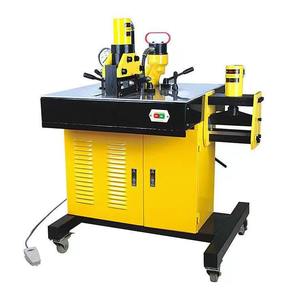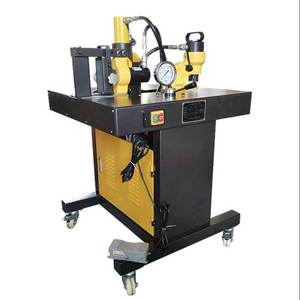
All categories
Featured selections
Trade Assurance
Buyer Central
Help Center
Get the app
Become a supplier

(1239 products available)



















A portable busbar bending machine is an equipment made to bend busbars in different angles and shapes as per specific requirements in a portable manner. Portable busbar bending machines are usually small-sized or lightweight, allowing the transportation and movement of the machines easily from one place to another. These machines are usually used in places where the busbars are required to be bent on-site or in situations where limited workspace is available. Despite their compact size, they are designed to effectively and accurately carry out busbar bending tasks.
Examples of portable busbar bending machines include the following:
Handheld busbar benders:
These are manual devices that allow operators to bend busbars by hand after the busbars have been secured in place using clamps or any other securing mechanism. These devices are very lightweight, and operators can easily use them to make shallow bends on busbars.
Portable electric busbar benders:
These are power-operated units that use electricity to bend busbars into various shapes and sizes. The devices come with several features and specifications that allow operators to make accurate and precise bends. Portable electric busbar benders are more convenient than manual busbar benders since they do most of the work and allow operators to make more complex and precise bends.
Hydraulic portable busbar benders:
These types of bending machines use hydraulic power to bend busbars into different shapes as per specific requirements. The machines use hydraulic cylinders and pumps to apply force to the busbars so that they can be bent. Hydraulic portable busbar benders are more powerful than their electric counterparts, and they offer greater flexibility and precision. However, the machines might be heavier and bulkier, depending on the capacity.
Portable CNC busbar benders:
These are more advanced portable bending machines that are computer-controlled for precision bending. The machines come with digital controls and programmable features that allow operators to bend busbars accurately and precisely. Some models even come with a touchscreen that enables quick and easy set-up. Furthermore, these machines are usually used in applications that require multiple bends with tight tolerances, and they have the capacity to handle larger busbars.
Combination bender cutters:
These portable bending machines feature bending and cutting capabilities combined in one machine. Such machines allow operators to cut and bend busbars as required without having to change equipment. This provides greater convenience as well as efficiency at the worksite.
Like any other machine, a portable busbar bender machine requires maintenance to ensure it functions flawlessly for years. Regular maintenance ensures that the components are working as they should, reducing the chances of any breakdown occurring unexpectedly.
Portable busbar bending machines can be used in multiple industries that require busbars. They are frequently used in power distribution, railways, wind and solar energy, marine and metallurgy sectors. The versatility and compactness of portable busbar bending machines make them ideal for use in smaller workshops or remote sites requiring quick fixes or customized busbars.
Here are some specific scenarios where a busbar bending machine is commonly used:
Consider the following aspects of portable busbar bending machines for sale when purchasing these tools for use or resale.
Applicable Industries
Some devices are made specifically for use in power engineering, telecommunications, or construction. On the other hand, some are multipurpose. They can be used in various industries, including telecommunications, construction, energy, and automotive manufacturing. Their versatility makes them valuable tools for working with busbars across different sectors. Businesses should consider the industry applications where busbars need to be bent. Then, select machines that fit specific needs and requirements for efficient operations.
Materials
Materials-quality portable busbar bending machines can work with various materials like aluminum, copper, and other alloys. They are built with sturdy galvanized steel or malleable cast iron frames designed to withstand the rigors of bending operations. Alloys used in electric power transmission are extra strong, durable, and corrosion-resistant. This makes them ideal for power systems. On the other hand, aluminum alloys are lightweight and have good conductivity. These properties make them suitable for automotive applications. Copper alloys possess superior electrical conductivity and thermal properties, making them ideal for high-performance applications. Select a machine compatible with the material buses use.
Capacity
The capacity of a portable busbar bending machine refers to the maximum size and thickness of busbars it can bend. It's important to select a bending machine with a capacity that matches the requirements. Choose a device whose maximum busbar width and thickness exceed what is needed for the project. If the capacity is too small, it will not be able to bend the required busbars. On the other hand, if it's too big, the machine will be unnecessarily large and more expensive to operate.
Maneuverability
Maneuverability refers to the ease of movement and handling of a portable machine in different work environments. These devices are made to be moved easily from one location to the next. The weight of the tool affects how easy or difficult it is to carry around. More compact, lighter machines allow for more convenient transportation. Considerable weight is usually added by electric motors, hydraulic pumps, and other accessories. Keeping machines as light as possible while ensuring they can bend busbars is important. Select a device that is not too heavy for the intended use and application.
Q1: Are there any busbar bending machine limits on what materials they can work with?
A1: Yes, machines are designed to work with specific materials and strengths. Always consult the machine's specifications to ensure compatibility with the intended material.
Q2: Can a portable busbar bending machine create complex shapes?
A2: While portable machines are excellent for making bends and angles, they may not be suitable for creating highly complex shapes. Complex shapes may require a more advanced machine or a combination of machines.
Q3: Is it easy to transport a busbar bending machine?
A3: Yes, one of the main advantages of portable machines is that they are easy to transport, whether moving from one job site to another or storing the equipment when not in use.
Q4: Can a portable busbar bending machine create multiple bends in a single piece of material?
A4: Yes, as long as there is sufficient space between the bends and the material does not exceed the machine's capacity, multiple bends can be made in a single piece.